Related Research Articles

Lü Bu, courtesy name Fengxian, was a Chinese military general, politician, and warlord who lived during the late Eastern Han dynasty of Imperial China. Originally a subordinate of a minor warlord Ding Yuan, he betrayed and murdered Ding Yuan and defected to Dong Zhuo, the warlord who controlled the Han central government in the early 190s. In 192, he turned against Dong Zhuo and killed him after being instigated by Wang Yun and Shisun Rui, but was later defeated and driven away by Dong Zhuo's followers.
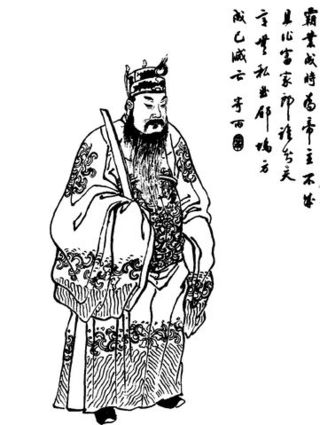
Dong Zhuo, courtesy name Zhongying, was a Chinese military general, politician, and warlord who lived in the late Eastern Han dynasty. At the end of the reign of the Eastern Han, Dong Zhuo was a general and powerful minister of the imperial government. Originally from Liang Province, Dong Zhuo seized control of the imperial capital Luoyang in 189 when it entered a state of turmoil following the death of Emperor Ling of Han and a massacre of the eunuch faction by the court officials led by General-in-Chief He Jin.

Diaochan was one of the Four Beauties of ancient China. Although based on a minor historical personage, she is mostly a fictional character. She is best known for her role in the 14th-century historical novel Romance of the Three Kingdoms, which romanticises the events in the late Eastern Han dynasty and the Three Kingdoms period. In the novel, she has a romance with the warrior Lü Bu and causes him to betray and kill his foster father, the tyrannical warlord Dong Zhuo. She was praised in tales as a woman of unrivaled beauty who did what no other hero in China was able to accomplish: put an end to Dong Zhuo's regime of terror and the eventual end of Lǚ Bu; triggering the events that would lead to the formation of the Three Kingdoms: Cao Wei, Eastern Wu, and Shu Han.
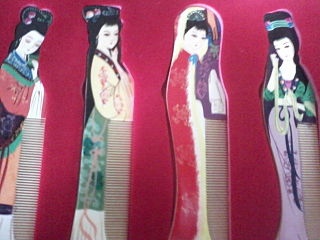
The Four Beauties or Four Great Beauties are four Chinese women who were renowned for their beauty. The four are usually identified as Xi Shi, Wang Zhaojun, Diaochan, and Yang Yuhuan. Among them, Diaochan is a fictional character while the rest have been greatly embellished by legend. They gained their reputation from the influence they exercised over powerful men and, consequently, their impact on Chinese history.
Li Su was a Chinese military officer serving under the warlords Dong Zhuo and Lü Bu during the Eastern Han dynasty of China.

Wang Yun, courtesy name Zishi, was a Chinese politician who lived during the late Eastern Han dynasty. He served in the Han government through the reigns of three emperors – Emperor Ling, Emperor Shao and Emperor Xian. The highest offices he served in were Manager of the Affairs of the Masters of Writing and Minister over the Masses in the early reign of Emperor Xian. In 192, with help from the general Lü Bu and others, he plotted a successful coup in Chang'an against Dong Zhuo, a tyrannical warlord and regent who controlled the Han central government, and assassinated him. However, later that year, Dong Zhuo's followers staged a counter-coup and seized back control of the central government in Chang'an. Wang Yun, along with his family members, was captured and executed.

Ding Yuan, courtesy name Jianyang, was a Chinese politician and warlord who lived during the late Eastern Han dynasty of China. In 189, both he and Dong Zhuo were summoned into the capital Luoyang with their individual troops to assist in the struggle against the powerful eunuch faction. However, Ding Yuan was eventually killed by his trusted aide Lü Bu, who had been bought over by Dong Zhuo.
Li Ru (fl.180–192), courtesy name Wenyou, was an official serving under the warlord Dong Zhuo during the late Eastern Han dynasty of China.

The end of the Han dynasty was the period of Chinese history from 189 to 220 CE, roughly coinciding with the tumultuous reign of the Han dynasty's last ruler, Emperor Xian. It was followed by the Three Kingdoms era. During the end of the Han dynasty, the country was thrown into turmoil by the Yellow Turban Rebellion (184–205). Meanwhile, the Han Empire's institutions were destroyed by the warlord Dong Zhuo and fractured into regional regimes ruled by various warlords, some of whom were nobles and officials of the Han imperial court. The warlord Cao Cao took control of Emperor Xian and his court in 196 and began gradually reunifying the empire. Cao Cao ostensibly operated under Emperor Xian's rule, though in reality the emperor was a hostage.

The men's 500 metres speed skating competition for the 2006 Winter Olympics was held in Turin, Italy. The competition consisted of two separate 500 metre races, with the competitors ranked by their cumulative time from the two races.

The Campaign against Dong Zhuo was a punitive expedition initiated by a coalition of regional officials and warlords against the warlord Dong Zhuo in 190 in the late Eastern Han dynasty. The members of the coalition claimed that Dong had the intention of usurping the throne by holding Emperor Xian hostage and by establishing a strong influence in the imperial court. They justified their campaign as to remove Dong from power. The campaign led to the evacuation of the capital Luoyang and the shifting of the imperial court to Chang'an. It was a prelude to the end of the Han dynasty and, subsequently, the Three Kingdoms period.
Yukitoshi Hori is a Japanese actor, voice actor and narrator from Setagaya, Tokyo. He is the elder brother of fellow voice actor Hideyuki Hori and is currently represented by Aoni Production.

James Ellis LuValle was an American athlete and scientist. He won the bronze medal in the 400 metres at the 1936 Summer Olympics, and was an accomplished chemist and founder of the Graduate Students Association at the University of California, Los Angeles (UCLA).
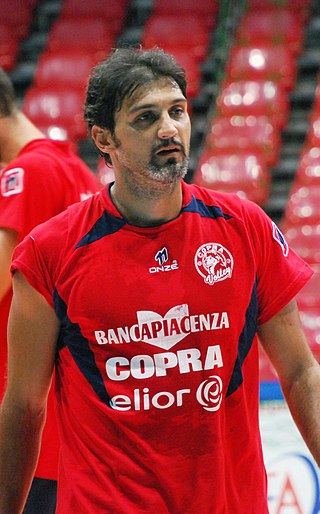
Samuele Papi is an Italian former volleyball player, a member of Italy men's national volleyball team in 1993–2012, silver and bronze medalist of the Olympic Games, multiple winner of the European Championship and World Championship, silver medalist of the World Cup 2003, three-time CEV Champions League winner, double CEV Cup winner, four-time Challenge Cup winner, six-time Italian Champion.
Lü Lin is a Chinese table tennis player and Olympic champion. He uses a pen-grip topspin style, and is best known for the combination of him and Wang Tao in men's doubles championships.
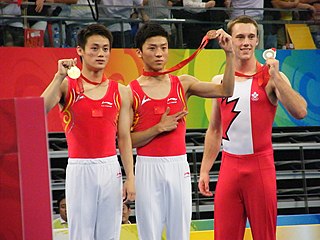
Lu Chunlong is a male Chinese trampoline gymnast who competed in the 2008 Summer Olympics where he won the gold medal. Four years later, at the 2012 London Olympics, Lu won the bronze medal while Dong Dong, the bronze medalist from Beijing, won the competition.

Lu Ying is a Chinese competitive swimmer. She competed for China at the 2012 Summer Olympics in London and the 2016 Olympics in Rio. She won a silver medal in the women's 100 metre butterfly at the 2012 Summer Olympics.
Lü Zhiwu, more commonly spelled "Lv Zhiwu", is a Chinese swimmer, who competed for Team China at the 2008 Summer Olympics and 2012 Summer Olympics. At the 2012 Summer Olympics, he was part of the Chinese 4 x 200 m team that won bronze.
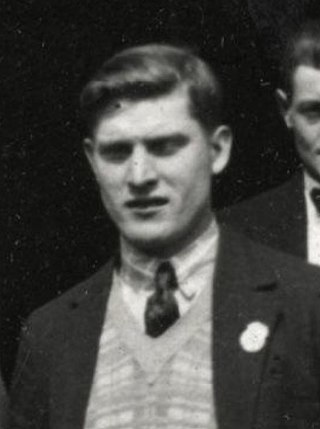
Paul Feierstein was a Luxembourgian footballer. He competed at the 1924 Summer Olympics and the 1928 Summer Olympics.

The Battle of Chang'an, also known as the Sack of Chang'an, took place in the western Chinese imperial capital city of Chang'an on 28 June 192, at the end of the Han dynasty, the prelude of the Three Kingdoms.
References
- ↑ Evans, Hilary; Gjerde, Arild; Heijmans, Jeroen; Mallon, Bill; et al. "Lu Zhuo Olympic Results". Olympics at Sports-Reference.com. Sports Reference LLC. Archived from the original on 31 January 2012. Retrieved 7 November 2019.